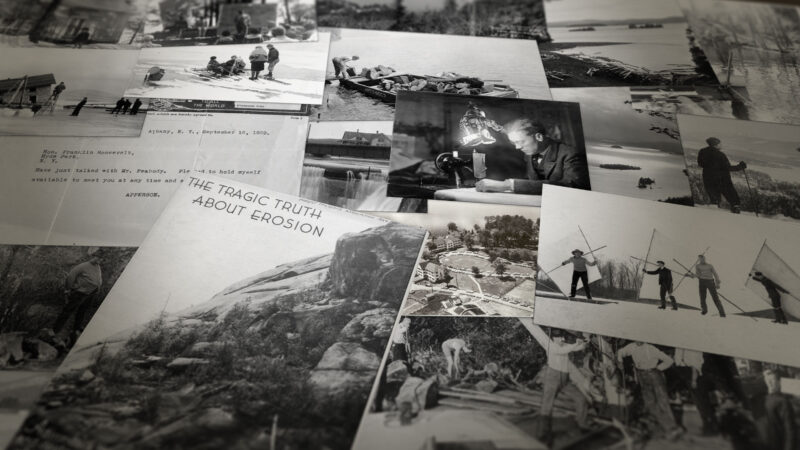- March 8, 1962 – A talk given to the Rotary Club of Schenectady, by JSA
Forever Wild
New York State Forest preserve
A prominent Rotarian several years ago offered to help us defeat a proposal which endangered our State Forest Preserve. I suggested our opponents were sometimes ruthless and if he had dependents he might not want to take the risk. He quickly replied with emphasis that he had fought in two wars, had been wounded twice and declared dead once and was now receiving a pension from two governments. He insisted on knowing what our program was and when he could start work. This fighting spirit of Colonel C. Seymour Bullock, with the help of many other Rotarians, put new life in our campaign which finally defeated the amendment. I am glad of this opportunity to again express my appreciation.
We have the impression and venture to suggest that many people confuse themselves and others by not realizing that unless they can first agree on the main purpose for the State Forest Preserve they cannot hope to agree on a procedure or law for carrying out the purpose. The main purpose now expressed in the constitution and agreed to many times by vote of the people is the protection of water sources on the Upper Water Shed, preventing erosion, and the protection of wild life and natural forest recreation areas. The heart of the present law is embodied in the words “forever wild” contained in Article XIV, section 1 of our State Constitution. A brief review of the deliberations leading up to the adoption of these words is significant and I have been asked to comment.
Historical records indicate that when white men first came to New York State there were luxuriant forests and obviously no forest management. There was an abundance of game, and again no game management. There were plenty of fish and no need existed for fish man-made fish hatcheries. We therefore cannot escape the fact that uninterrupted natural processes do result in many values which are essential to our well-being. Records also indicate these vital uninterrupted natural processes were in the minds of our leaders when they found they could not protect the Upper Water Shed of our State against destructive tree-cutting operations with statute laws which could be changed overnight. Our leaders finally decided that any dependable law for protecting such precious lands and forests should require careful consideration by two legislatures and a vote of the people. Hence in 1894 they proposed a new article in the constitution including the plain wording “forever wild”. This was approved by the electorate. Hardly a year has passed since then without some proposal to weaken this protection. Several amendments have been adopted but many more such proposals were defeated.
The people of our State are now faced with another effort even more serious than ever before to weaken the law protecting our Forest Preserve. The Anderson-Bartlett proposal would repeal Article XIV, section 1 in its entirety and divide the Forest Preserve into three parts: a) approximately 30 percent would have a forest maintained but not necessarily a natural forest as now required by the Constitution; b) not more than 10 percent maintained with facilities for various types of recreation…etc.; c) the remainder of the preserve, approximately 60 percent, would be so-called wilderness recreation area with “foot and horse trails. Service roads and open shelters, subject to law.” This of course means a statute law not subject to the direct approval of the people as now required under the State constitution.
It always seems reasonable and fair to base our opinions and procedures on actual results rather than depend on theory or speculation. In this instance the records show that about everything that could be done, good, bad and indifferent, has been done somewhere in the sixteen Forest Preserve counties of New York State. If reviewed fairly this could form a sound basis for the future use of these lands. Certainly our past experience warrants us in feeling apprehensive about the Anderson-Bartlett proposal and it is reasonably certain if such a radical proposal were adopted there would be new “log-rolling” in the legislature and destructive “log-rolling” on the State Forest Preserve lands.
- S. Apperson
President, Forest Preserve Association of New York State, Inc.
